Anxiety is a common condition, and far more people likely experience it than are willing to discuss it. Worse, anxiety often goes hand in hand with depression and many other health conditions. Yet medication for anxiety often has serious side effects. However, there are many possible pathways to natural anxiety relief. An especially promising one is acupuncture, an age-old healing technique, according to several studies on the subject. What is more, it may provide other health benefits as well. This article also discusses other forms of natural anxiety relief if acupuncture is not for you.
» Read our complete long-read article on the benefits of acupuncture for Adrenal Fatigue Syndrome
» Adrenal Fatigue FAQs
» Take our 3-minute test to see if you may have Adrenal Fatigue
However, it is important to note that if you are already on anxiety medication, DO NOT suddenly stop this kind of medication. It can cause serious withdrawal side effects. Instead, talk to your doctor about a plan to taper off the medication gradually, if you decide that's the best course of action for you.
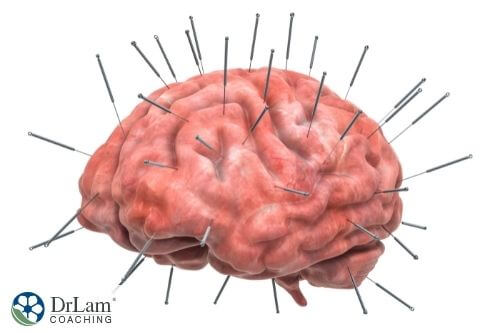 Acupuncture, a Traditional Chinese Medicine healing technique, has for over 3,000 years been used to address a variety of ailments. It improves various body functions by promoting your body’s self-healing abilities. This it does by stimulating certain glands, organs, tissues, or nerves. We call these areas acupuncture points or acupoints.
Acupuncture, a Traditional Chinese Medicine healing technique, has for over 3,000 years been used to address a variety of ailments. It improves various body functions by promoting your body’s self-healing abilities. This it does by stimulating certain glands, organs, tissues, or nerves. We call these areas acupuncture points or acupoints.
The acupuncture practitioner inserts thin, sterile needles into your skin at these various acupuncture points. Adding pressure to the area and combining it with heat or electrical stimulation may improve the treatment's effects.
Traditionally, Chinese Medicine ascribes to the philosophy that everything in the universe should be in a state of balance. This balance is made of two opposing forces, called yin and yang. So, if these forces become unbalanced in your body, for example, a health issue results.
Furthermore, your body has energy pathways through which energy flows. These pathways are called meridians, and the energy is referred to as "qi." It is also spelled as "chi" because it is phonetically pronounced as "chee." The constant flow of qi throughout the body keeps things in balance and your body healthy.
Sometimes, however, your meridians become blocked. This disrupts your energy flow and causes an imbalance in your body’s yin and yang. The result? Pain, illness, and/or a lack of energy. Acupuncture, however, according to Chinese Medicine, releases these blockages and allows chi to pass through the meridians once more, thereby restoring the balance between your yin and yang.
Current research indicates that many of the claims made by practitioners of ancient Chinese Medicine are correct. The positive effect on our nervous, endocrine, immune, cardiovascular, and digestive systems have been supported by evidence. Acupuncture may improve your digestive function, resolve different types of pain, help with sleep issues, improve your overall sense of wellbeing, and provide natural anxiety relief.
Interestingly, there is no scientific evidence that the meridians used in acupuncture exist. Neither is there any evidence disproving their existence. Some scientists, however, relate its effectiveness to neuroscience, seeing acupuncture points as areas where you can stimulate muscles, connective tissue, glands, organs, and nerves. As stimulation increases blood flow to these areas, it may also trigger your body’s natural pain killers.
The U.S. Food and Drug Administration (FDA), in 1997, approved using acupuncture needles as medical devices. Acupuncture was not recognized as a means of helping to address medical conditions before then. The same year saw the National Institutes of Health (NIH) recognize acupuncture as a means of pain management and in helping in the management of other medical conditions. One of these is its use in providing natural anxiety relief.
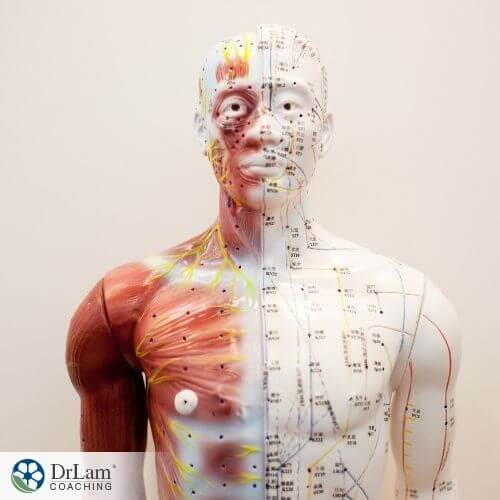 Anxiety results from stress. Any form of stress, albeit psychological, physical, or environmental in nature. Your body’s natural stress response, the NeuroEndoMetabolic (NEM) stress response, reacts with an increase in stress hormones, a decrease in the production of other hormones, and changes in body functions. This is because your body’s prime concern at the time is survival.
Anxiety results from stress. Any form of stress, albeit psychological, physical, or environmental in nature. Your body’s natural stress response, the NeuroEndoMetabolic (NEM) stress response, reacts with an increase in stress hormones, a decrease in the production of other hormones, and changes in body functions. This is because your body’s prime concern at the time is survival.
The NEM stress response results in a cascade of events that, when short-term in nature, have no discernable effect on your overall health. For optimal function, your body needs to stay in a state of balance, similar to the principles of yin and yang. Long-term stress and a continued NEM response push the body out of balance and could have devastating consequences.
One of these is increased anxiety, which, in itself, does not seem to be a major health issue. But this anxiety, a symptom associated with high levels of stress hormones, is not the only problem. Prolonged stress could result in depression, heart issues, high blood pressure, high cholesterol, health issues related to hormone imbalance, diabetes, arthritis, adrenal fatigue, and many others.
Natural anxiety relief methods may help you deal with increased anxiety. They may also help you deal with the results of stress due to their soothing abilities. Acupuncture may well be one of these methods.
It is estimated that more than 40 million Americans suffer from anxiety. The conventional care plan sees the use of medications taking a predominant role. Although these medications may reduce your anxiety levels, they do not address the root cause of anxiety, or they come with a variety of side effects.
Depending on the specific medications used, these side effects could include, amongst others, stomach issues, drowsiness/fatigue, headaches, memory loss, concentration difficulties, confusion, balance or coordination issues, speech problems, and blurry vision.
Sometimes the medications cause more problems than the initial issue.
However, if you are taking medications for anxiety, it is important that you DO NOT suddenly stop this kind of medication. You will need to talk to your doctor and taper off your dose, or risk severe withdrawal symptoms and adverse reactions.
 There is a lot of research that shows acupuncture benefits those with anxiety issues. Those conducting the research still do not understand the "how" and the "why" of it. They do concur that acupuncture does provide general natural anxiety relief, however. The present research focuses on the use of acupuncture in addressing specific types of anxiety. These studies include panic attacks, obsessive-compulsive disorder, and post-traumatic stress disorder.
There is a lot of research that shows acupuncture benefits those with anxiety issues. Those conducting the research still do not understand the "how" and the "why" of it. They do concur that acupuncture does provide general natural anxiety relief, however. The present research focuses on the use of acupuncture in addressing specific types of anxiety. These studies include panic attacks, obsessive-compulsive disorder, and post-traumatic stress disorder.
Regarding general anxiety, a 2015 study found that acupuncture provided relief to those taking part in the study who did not benefit from psychotherapy or the use of medications. A 2016 study conducted on rats noted how acupuncture affected their fight or flight response. By controlling an increase in stress hormone production, you could very well control anxiety.
The takeaway here is that, although research is still trying to find out how acupuncture benefits those with anxiety, it certainly seems to work. The overall consensus is that it has a calming effect on people, even those without anxiety issues.
Besides providing natural anxiety relief, acupuncture may benefit those suffering from a variety of other health issues as well. And clinical studies confirm this. The National Center for Complementary and Integrative Health (NCCIH) notes that it has been proven to help with neck pain, knee pain, lower back pain, headaches, migraines, and osteoarthritis. Furthermore, the World Health Organization, in 2003, made a list of conditions for which acupuncture may prove of benefit. These health conditions include, amongst many others:
According to the WHO, it may also provide limited relief for those suffering from the following:
Interestingly, the WHO also suggests that acupuncture for natural anxiety relief may help in addressing various infections, including urinary tract infections.
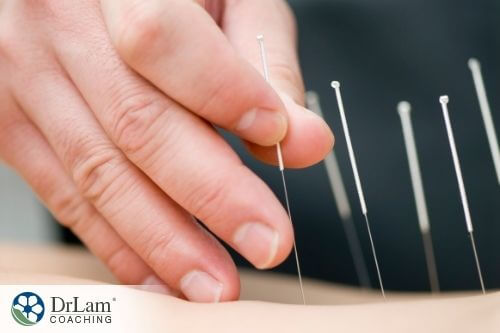 Acupuncture has many benefits as opposed to the conventional approach of dealing with anxiety.
Acupuncture has many benefits as opposed to the conventional approach of dealing with anxiety.
As with most things, this type of natural anxiety relief may not benefit everyone. Those with bleeding disorders or who take blood-thinning medications, for example, may prefer not to consider acupuncture. This is because bleeding may occur at the needle insertion sites. You also need to consider that the affected area may bruise, and you may experience soreness afterward.
Although exceedingly rare, there have been instances of a collapsed lung when a needle was deeply inserted into either the chest or upper back area.
Another risk factor to take into consideration is that the practitioner may use an unsterilized needle. This could cause an infection. Please note that this happening in the USA is highly unlikely but still possible, due to the laws in place. Here, pre-packaged sterilized needles, According to the FDA, need to meet certain standards and are used only once by a licensed practitioner.
Acupuncture could be considered an invasive procedure.
Many people find a qualified acupuncturist via word of mouth. Someone you know, or who knows someone else, who has gone for treatment. But most states require practitioners to have a license. A licensed acupuncturist would have passed the National Certification Commission for Acupuncture and Oriental Medicine (NCCAOM) exam or their foundations of Oriental Medicine, acupuncture, and biomedicine exam.
You can find them by visiting the National Certificate Commission in Acupuncture and Oriental Medicine (NCCAOM) website. When contacting a practitioner, please ask them about their training and experience in this discipline. Do remember that certification requirements may differ in different states.
Please note that while many insurance policies cover acupuncture treatments, not all do. It is best to find out about this if you intend for your health insurance to cover this expense.
Your healthcare professional will first ask you questions about your health history. They will also look at your tongue, assessing its color, shape, and what the coating looks like. Your pulse rate will be taken, and other possible physical examinations may take place. The latter depends on any possible existing health issues you may have.
Upon completion of the general assessment, your acupuncturist may recommend a plan that addresses your issue. Please note each person’s assessment plan will differ and depends on your general health at the time, the condition that needs addressing, and your health history.
Once preliminaries are over, you would lay on a treatment table. You may be asked to lie on your back, front, or side. The position depends on the area in which the acupuncturist needs to work. Various acupoints on your body will then receive attention. This is done by inserting fine needles in these previously determined acupoints. The thickness of the needles would depend on the area of the body targeted and the condition treated.
In most cases, people undergoing such a procedure feel nothing. Some may feel a minimal amount of discomfort while the acupuncturist places the needles. In most cases, you would feel only a dull ache which quickly subsides. The needles are left in your body for anything between five to thirty minutes. Sometimes the acupuncturist will add a low energy voltage to the needles or apply additional heat to the area.
Please note that qualified acupuncturists would use only single-use, sterile, disposable needles. Their labeling and manufacture need to adhere to the U.S. Food and Drug Administration (FDA) standards because of their labeling as medical devices.
A session may last between one hour and one and a half hours. This includes the therapy, a discussion of your symptoms, your concerns, and how your health has benefitted from the previous therapy if you have already gone for one. The actual treatment, when the needles are inserted and the period you lay with them in you, usually lasts only 30 minutes in total.
Everyone is likely to have a different experience after a session. Some would feel tired and want to take a nap or have a feeling of deep relaxation. Others may feel energized and ready to take on the world.
As to the symptoms, some may immediately feel an improvement, others may feel an improvement within a few days, and yet others may only see an improvement after a few sessions. The most common response, however, is a feeling of contentment. Changes in your sleeping habits and bowel movements may also occur.
Each person is different. Essentially, the number of sessions needed for natural anxiety relief depends on your state of health, your condition, and how well you respond to the therapy. Those with a chronic health issue may have two acupuncture sessions a week over a few months. In most cases, an acute condition only needs between eight to twelve sessions before you notice an improvement.
Costs depend on various factors, such as where you live, i.e., which state or city in the state, or whether your medical insurance covers your chosen practitioner. You thus need to do your homework.
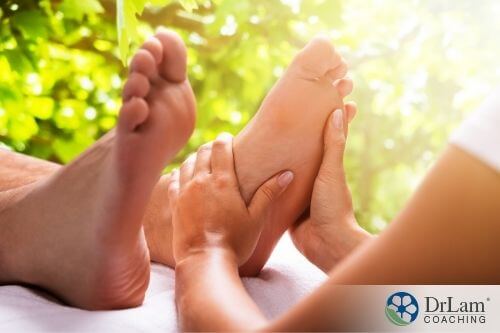 If you don't have an acupuncturist near you, there are other forms of natural anxiety relief available. Please note that you should never try acupuncture on your own, as it could worsen symptoms and cause infections or other serious problems.
If you don't have an acupuncturist near you, there are other forms of natural anxiety relief available. Please note that you should never try acupuncture on your own, as it could worsen symptoms and cause infections or other serious problems.
Meditation is a relaxation technique practiced for eons. Research also shows that it is an excellent form of natural anxiety relief. It helps reprogram your neural pathways to release feelings of anxiety. You also notice your breathing when meditating. This takes us to the next form of natural anxiety relief – breathing.
There are many different breathing exercises you can try for anxiety, such as adrenal breathing, resonant breathing, or alternate nostril breathing. Proper breathing induces a state of relaxation, which, in turn, helps reduce anxiety.
Yoga is a mind-body practice that combines breathing techniques, physical postures, and meditation. It strengthens your core muscles, helps posture, and promotes physical and mental wellbeing. Research shows that yoga reduces stress, anxiety, and depression.
Tai chi is a martial art aimed at defending yourself with health benefits. It is a set of different exercises and stretches that continually flow, keeping your body in constant, gentle motion. This martial art is often described as "meditation in motion." Anyone can practice this martial art because it has a low level of impact and makes use of slow motions. Even people in wheelchairs can do tai chi.
Tai chi helps you maintain balance, flexibility, and muscle strength while promoting mental health and reducing anxiety.
Much like acupuncture, reflexology sees the practitioner putting pressure on certain pressure points. The areas concerned include the hands, feet, and ears. The theory behind this practice is that pressure points are connected to various organs and body systems. This is very much in keeping with the thought processes governing acupuncture.
For headaches, for example, apply pressure to the muscle between your thumb and forefinger. You may address anxiety by pressing on the point directly above your nose and between your eyebrows. If insomnia is an issue, rub this area in a clockwise and then counterclockwise fashion. There is a lot of literature about the different reflexology points and their function.
Reiki is a form of energy healing started in Japan. Jikiden Reiki is the original form of reiki. But another form, called Usui reiki, was developed to meet with western sensibilities. The latter is also a more structured form of reiki. Roughly translated, the word "reiki" means universal life force or life energy.
Reiki has many benefits for the recipient and is a natural way of enhancing your body’s ability to self-heal. The main benefit of this practice is to promote relaxation and reduce stress and anxiety. The main aim of reiki is to open blockages throughout your body.
As with acupuncturists and reflexologists, however, you may not find a reiki practitioner near you. You could, however, try ten reiki steps in the comfort of your own home. You can do this yourself and do not need someone else to help you.
Please note that you can practice these ten steps anywhere, at any time, whether standing, sitting, or lying down. As long as you are comfortable, you will do fine. It is best to hold each position for two minutes before going on to the next.
You may, after a reiki session, feel tired. You may also experience a headache and have slight stomach upset.
Those undergoing a reflexology session may feel light-headed or slightly nauseous afterward. It's important to remember that these side effects are temporary and generally indicate that your body is releasing stored toxins and negative energy. To minimize these effects, ensure you stay hydrated and give yourself time to rest and recover after your session.
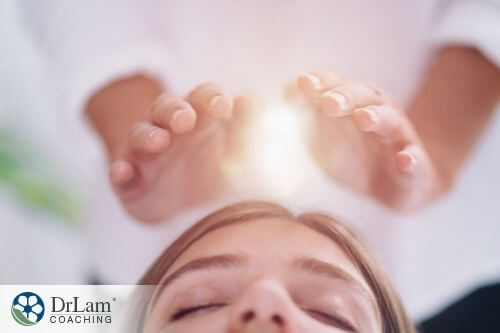 Modern science advocates the use of medications and psychotherapy when dealing with anxiety issues. While psychotherapy may help you learn to deal with anxiety, the medications prescribed may often have unwanted side effects. A holistic approach to the problem is through natural anxiety relief, such as acupuncture and the other methods mentioned. Many people find acupuncture to be calming and it has few side effects for most people.
Modern science advocates the use of medications and psychotherapy when dealing with anxiety issues. While psychotherapy may help you learn to deal with anxiety, the medications prescribed may often have unwanted side effects. A holistic approach to the problem is through natural anxiety relief, such as acupuncture and the other methods mentioned. Many people find acupuncture to be calming and it has few side effects for most people.
If you would like to know more about or need assistance with any form of natural anxiety relief, the team at Dr. Lam Coaching can help. We offer a free** no-obligation phone consultation at +1 (626) 571-1234. We will privately discuss your problem and various options. You can also send us a question through our Ask The Doctor system by clicking here.
» Read our complete long-read article on the benefits of acupuncture for Adrenal Fatigue Syndrome
» Adrenal Fatigue FAQs
» Take our 3-minute test to see if you may have Adrenal Fatigue
Anxiety results from stress, as does adrenal fatigue. Stress, as a matter of fact, is often one of the symptoms of this condition. So yes, going for a few natural anxiety relief sessions may not only help you with your anxiety but may also help provide support for overworked adrenals.
"I want you to know how much I appreciate it"
"It is very kind for a person of your stature to take the time to respond to a stranger, and I want you to know how much I appreciate it."